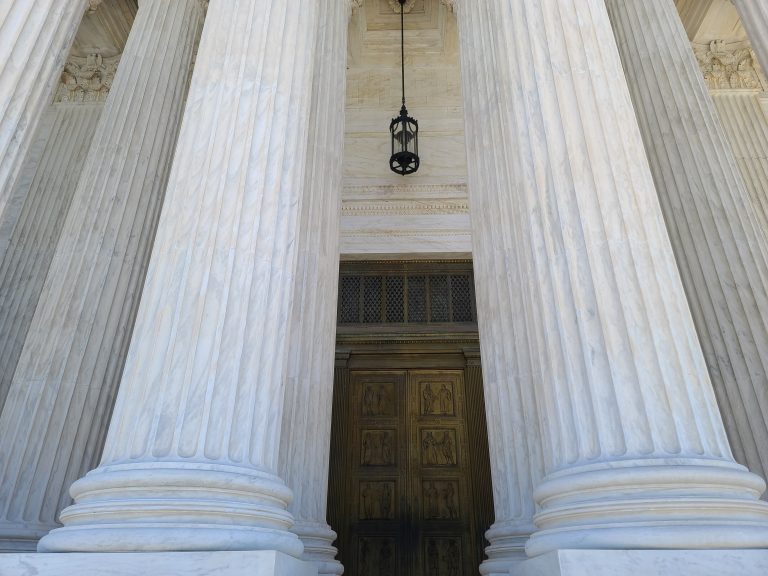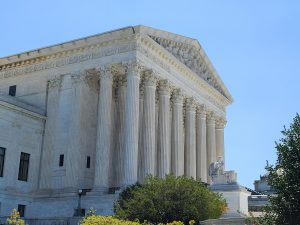Academics and scholars who study the Second Amendment are uncertain about how the Supreme Court’s latest gun case will come out. Most who talked to The Reload think the Court will uphold the law being challenged, but a few say there’s a little-known and potentially-irreconcilable weakness.
Late last month, the Supreme Court agreed to hear United States v. Rahimi. It deals with whether the federal ban on those subject to domestic violence restraining orders possessing guns is unconstitutional. A Fifth Circuit panel said it is, but most experts recently told The Reload they expect the Supreme Court could go the other way.
Still, none of them were entirely sure. And several brought up one particular aspect of the federal prohibition that could ultimately doom it: the fact it is achieved via a civil proceeding that provides fewer due process protections than criminal trials.
George Mason University professor Robert Leider, a former clerk for Justice Clarence Thomas who now teaches at the Antonin Scalia Law School, noted the federal law in question details two different standards for what qualifies as a domestic violence restraining order.
“The federal ban includes two prohibiting circumstances: either the restraining order must have ‘a finding that such person represents a credible threat to the physical safety’ of a family member or the restraining order must ‘by its terms explicitly prohibit the use, attempted use, or threatened use of physical force’ against a family member,” he said.
Leider argued the first circumstance has at least some historical backing, a key metric in the Supreme Court’s Bruen test for gun cases.
“There is a common-law tradition of requiring those for whom there are credible threats that they will commit acts of violence against others, including close family members, to post sureties that they will keep the peace,” he said. “And on the failure to post such sureties, they could be temporarily jailed.”
But he argued the other kind of restraining order is “more problematic.” Mark W. Smith, former law professor and author of First They Came for the Gun Owners: The Campaign to Disarm You and Take Your Freedoms, agreed and went further. He said the constitutional footing for the second type of restraining order is completely unstable.
“If you are subject to a 922 g8 restraining order, you have not necessarily been convicted of a crime or anything; you’re just subject to a restraining order that involves you and someone that’s an intimate partner–could be a wife, ex-wife, ex-girlfriend, child, someone in the home, somebody connected to you domestically,” Smith said. “And that could be almost rubber-stamped anywhere in America that simply says that you and your intimate partner, your ex-spouse, whatever it is, you each have to go to a separate corner. Neither of you can get close to each other. You’re going to talk through lawyers. That’s it. That’s what we’re gonna do. These are entered every day all across America. One of the issues here is, of course, these are done, in most instances, without any kind of real procedural protections of anyone’s liberty, including the right to keep and bear arms.”
Leider said court concerns over the due process questions predate even those of the Second Amendment claims at issue in the case.
“It will be interesting to see the government’s justification for why any restraining order that prohibits domestic violence should trigger a complete ban on possessing firearms, even when the order was not issued on the basis of finding that a credible threat existed to a family member,” he said. “The Fifth Circuit, long before Heller was decided, was troubled by that provision.”
In Mr. Rahimi’s case, the Fifth Circuit panel said his particular restraining order met both of the requirements to trigger a gun ban under the federal law. The order was issued in part because he was explicitly accused of assaulting the mother of his child. But, as Leider noted, the panel took issue with the lower due process protections involved in issuing the order–regardless of whether Mr. Rahimi was explicitly accused of being dangerous.
“Rahimi’s domestic violence restraining order satisfied both conditions; but it bears emphasis that the order at issue here was entered by agreement, in a civil proceeding, after Rahimi apparently waived hearing (the order states no formal hearing was held, and no record was created), and without counsel or other safeguards that would be afforded him in the criminal context,” Judge Cory T. Wilson wrote for the panel.
The Supreme Court may find the same deficiencies with the law that the Fifth Circuit panel did, even with Mr. Rahimi being specifically found dangerous. Or they may choose to uphold the sturdier aspect of the law while tossing the weaker provision. Of course, it is also possible they don’t do either.
UCLA law professor Adam Winkler, author of Gunfight: The Battle over the Right to Bear Arms in America, argued it’s hard to see the Court handing down a decision that lets Mr. Rahimi out of his conviction.
“Honestly, I just think as a matter of realpolitik, I just don’t see the Supreme Court saying it’s unconstitutional to ban domestic abusers from possessing firearms,” he said. “That just seems highly, highly unlikely that that’s going to be the conclusion of a majority of justices.”
Smith conceded Rahimi is not one he’d prefer to be the first Second Amendment case taken up in the wake of last year’s Bruen decision. He said a case about whether non-violent felons should be prohibited for life, such as the Third Circuit’s Range v. AG, would probably make more favorable ground for gun-rights advocates. But, unlike Winkler, he isn’t convinced the Court will uphold Mr. Rahimi’s conviction.
“If you asked me, frankly, would I rather see the Range case go up, or a case like Range, to the Supreme Court as the 922 g case, as opposed to Rahimi? Yeah, I would say it would be better to have one of those other cases,” he said. “But that does not mean we’re going to lose that Rahimi case. And that does not mean that it’s not gonna be an advancement of the Second Amendment.”






